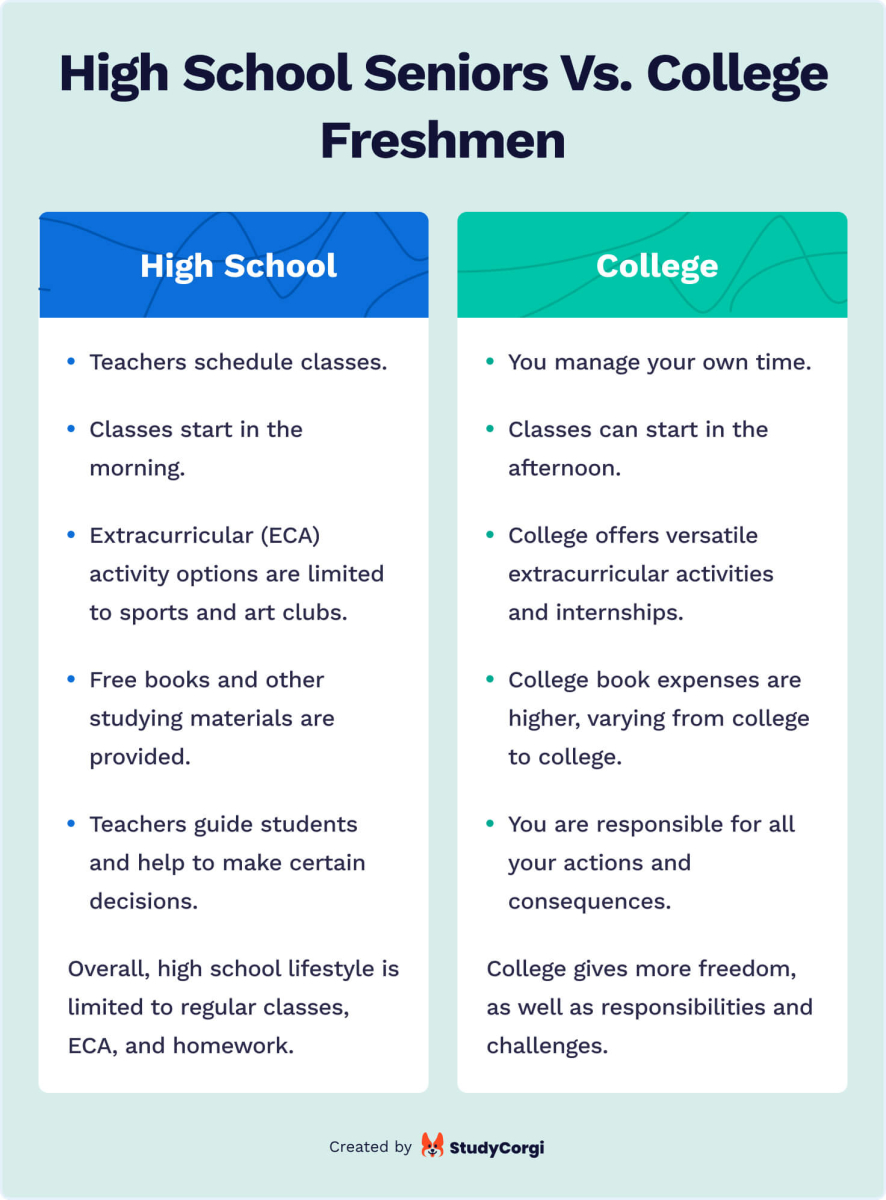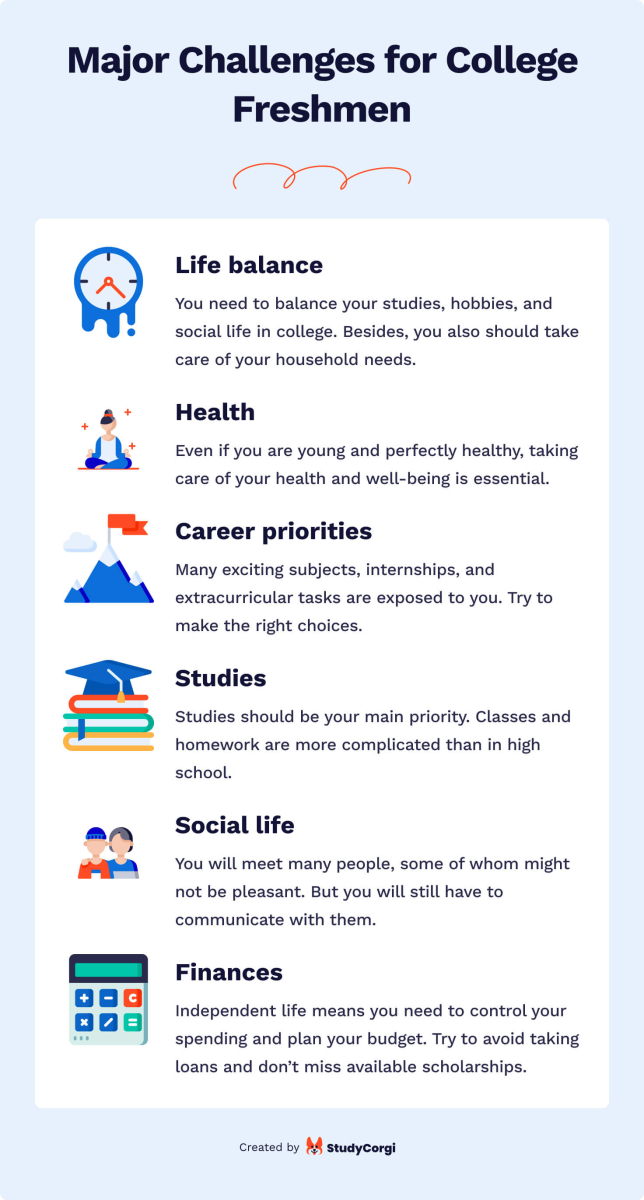The first year in college is the most confusing stage of student life. A huge number of changes happen to a freshman all at once: moving to a new place, embracing a new academic system, and meeting hundreds of people. All of this is challenging and can cause many difficulties.
You can make your freshman experience hassle-free if you understand the basics of the college lifestyle before leaving home. We created this article to help you navigate your first year in college. Here, you will find the most common freshman mistakes and tips to avoid them. And tip #1 – use our free research essay samples database for inspiration and fresh ideas.

😓 Freshman Year: Why Is It so Hard?
There are many reasons why the first year of college can be so demanding. The stress level will depend a lot on the college and the individual characteristics of each student. But we’ve done our best to describe all the issues first-year college students might encounter. We’ll start with the basics.
1. Who Is a Freshman?
Freshman means beginner or newcomer. This word is mainly used to describe a first-year student in college or high school. The term implies that a “fresh” person is naive, inexperienced, and young. This is the most popular way to talk about the first year of studies in the US. In England and Wales, first-year students are freshers. In Canada, they are first years or frosh.
You might be surprised, but first-year members of Congress are also freshman senators and congressmen. But we’ll be discussing college freshmen in this article.
2. College Freshmen Vs. High School Seniors
Despite being just one year apart, the lifestyles of high school and college students have huge differences.
See for yourself:
- Time management. In high school, teachers monitor your attendance and schedule your classes. In college, you manage your time and classes on your own. Some of the subjects are chosen individually.
- Studying. Classes in high school usually last up to six hours and start in the morning. In college, you have fewer classes and may have a window of rest during the day. You also need to spend more time studying on your own and conducting research.
- Extracurricular activities. In high school, the variety of ECA might be limited. Usually, they involve sports or art clubs. In contrast, college students typically spend a lot of time on campus. Some activities include studying in the library, participating in student organizations, and working at paid internships.
- Finances. High school provides students with free or cheap books and other studying materials. College book expenses are higher. It varies from college to college, but you will need to spend at least $200 each semester.
3. Why Is Freshman Year so Hard?
Some students find it very difficult to adapt to a new system. Everything changes: the studying rules, the format of classes, and the amount of homework. For some people, having so much freedom is exciting. For others, it might be challenging to keep up with all the responsibilities of living independently. Preparing food, attending classes, doing homework, and managing health issues are not easy tasks.
In addition, other stress factors are possible. Moving to another place and living with new people can be stressful. Freshmen can feel homesick and miss their friends. Meeting new friends and getting used to a new location takes time. Conflicts with roommates are possible too.

🚧 Major Challenges for College Freshmen
Now let’s structure the aspects of your life that will change once you step into college life:
- Career priorities
You will be exposed to many exciting subjects, internships, and extracurricular tasks. Freshmen often struggle to navigate these opportunities and make the right choices. - Life balance
Managing your studies, hobbies, and social life gets more complicated in college. In addition to these challenges, you will also need to take care of your meals and laundry. - Health
Now you’re the one responsible for your good and bad habits. Parents don’t control you, and it is not so easy to resist the temptation at first. - Studies
Studies should be your main priority out of all the activities available on campus. You have to deal with far more complicated homework than in high school. - Hobbies
Finding time and space for your hobbies can be challenging since studies will consume most of your time. - Social life
You will meet many people, and even though you might not like some of them, you will still have to communicate with them in the dorm or during classes.

🧑🎓 Common Academic Mistakes
In high school, everything is set up for you, which makes it difficult to manage your studying routine on your own once you get to college. Here are the main study mistakes of a freshman:
- Skipping classes.
- Choosing a major too early or without much thought.
- Choosing a major only for salary expectations.
- Taking on too many subjects or credits.
- Socializing too much or too little while studying.
- Focusing only on one subject.
- Working on deadlines at the last minute.
- Being late to classes.
- Never asking for help from peers or professors.
- Not thinking about internship possibilities in advance.
- Choosing too many or too few extracurriculars.
- Making studies your only occupation.
- Procrastinating on your homework.
- Pushing yourself too hard.
How to Avoid Academic Mistakes
Some first-year students manage not only to survive but also to thrive. They are not superhumans – they deal with the same issues as you. It’s a matter of creating healthy habits and perfecting your time management.
Let’s see how you can resolve or avoid freshmen mistakes in your studies.
- Create a timetable. You can implement this on paper or use an app. Make sure you keep track of all of your classes. Remember that you still have to pay for the classes you skip.
- Consult other students or professionals when deciding on your major. They can give you some useful information and insights.
- Plan your time well. Each subject requires time for homework in addition to attending classes. Make sure you have enough time for all your classes and assignments.
- Start working on a deadline as soon as you receive a task. Completing just one small step, like an outline, will help you down the road. Also, you will spend significantly less time on an assignment if the information is still fresh in your memory.
- Plan your rest time as well as your studies. This means creating a sleep schedule, taking days off, and rewarding yourself with small breaks between studying sessions. You can use the Pomodoro technique or set up your own studying rhythm.
💵 Major Financial Mistakes
Adult life means you need to control your spending and plan your budget. And one more thing: colleges can be costly. Many students borrow money to cover their tuition and other expenses. But you must always consider how you will pay it back before taking out a loan.
So let’s see what are the common financial mistakes you should avoid:
- Taking out big loans that cover daily expenses in addition to studies.
- Being uninformed about loan interest rates and other details.
- Having no understanding of how to return borrowed money.
- Overusing credit cards and not paying card balances.
- Investing too much money in foolish items or activities.
- Having no savings or emergency funds.
- Missing funding opportunities such as college financial aid, scholarships, grants, and contests.
How to Avoid Financial Mistakes
- Do your research on financial aid. Create a schedule of all the financial opportunities and their application deadlines. Every scholarship is worth your time since it could potentially help cover your expenses.
- Study how loans work. It is essential to know the difference between private and federal laws, interest rates, and repayment schedules.
- Plan your budget. Create a spreadsheet or a plan with all your semester or year expenses. Discuss the funding sources with the people who will financially support you.
- Control your expenses. Track everything you spend money on. Review your expenses weekly or monthly and see if you need to change something.
- Find a source of income. This does not necessarily mean you have to work at an office. It can be a remote, part-time job, a scholarship, or an occasional side job. There are also career opportunities on campus, which can be more challenging for a freshman.
🫁 Worse Health Mistakes
You also need to take care of your health even if you think you are young and perfectly healthy. Now you are the one responsible for your well-being.
Here are the main freshman health-related mistakes:
- Skipping meals, overeating, and eating junk food.
- Not sleeping enough or sleeping too much.
- Smoking, consuming alcohol, using drugs, or even drinking too much coffee.
- Giving up working out because physical education is not obligatory in college.
- Partying, working, or studying late at night.
- Studying for long hours without breaks.
- Skipping regular medical check-ups and vaccinations, not scheduling appointments with doctors.
- Having no emergency kit or essential medication at your place.
- Ignoring fatigue, depressive moods, or anxiety.
How to Avoid Health Mistakes
- Include regular meals, at least 8 hours of sleep, and sports in your timetable. It would be ideal to develop daily eating habits and healthy sleeping. If you don’t have enough time for sports, just ensure you are active during the day.
- Plan all your doctor appointments. Think about how often you need to visit your therapist and other health specialists and write it down. Create a year plan with these appointments.
- Do your best not to start bad habits. Just think about the amount of money people waste on alcohol and cigarettes. And then how much money they have to pay to deal with all the health issues that come from those bad habits.
- Prepare medication in advance. Keep a first-aid kit under your bed and buy all your prescribed medication, if you take any. Search for the nearest places where you can refill your prescription.
- Take care of your mental health. You can consult a campus specialist if you feel anxious or depressed.
☕ Typical Lifestyle Mistakes
It is incredibly complicated to balance your studies and personal life in college. Student life has its own rules and peculiarities, advantages and disadvantages. You’ll have to adapt to them; the earlier, the better.
These lifestyle mistakes are the most common among first-year students:
- Feeling sad because college life is not what you anticipated.
- Arguing with roommates who have contrasting world views and lifestyles.
- Feeling homesick or lonely because you are far away from your family and friends.
- Making dating a higher priority than studies or forgetting about safe sex practices.
- Being disorientated because of all the opportunities and extracurricular options.
- Stressing about choosing and declaring your major.
- Becoming disappointed or unmotivated because of low grades or criticism.
- Skipping social activities because you are busy with your studies all the time.
- Wasting your time on disputes with people you don’t like.
How to Avoid Lifestyle Mistakes
- Be open to new acquaintances. Thousands of other freshmen feel lonely and search for new companions, too. It might be challenging to figure out who is who at first. But you will never know who might become your friend if you don’t meet people.
- Avoid irrelevant conflicts. You will save lots of time and energy by not trying to prove yourself right to everyone.
- Prioritize your tasks. Decide on the things that are critical to you. Since there are so many campus activities, give some of them a try. You can decide later which ones you enjoy and how to fit them into your schedule.
- Be smart about your love life. You can fall in love easily because of all the emotions during the first year of college. Just don’t forget about safe sex. You can consult the college health center for more information.
- Leave some time for fun. In your free time, go to parties and sports events and hang out with friends. Remember that networking can be as beneficial as a college degree in your career.
🏁 Conclusion. Tips for a Successful Freshman Year
Are you ready to accept the challenge of the first year of college? Let’s recap the main insights from this article:
- Being a freshman is stressful for everyone.
- You deal with much more responsibility in college than in high school.
- Self-discipline and smart planning are vital to managing your classes and deadlines.
- Apart from studies, care for your health, social life, and finances.
- The less money you take out in college loans, the less you will have to return later.
- You should apply for scholarships every year to minimize your tuition fees.
- It is ok to feel homesick after moving to a different place.
- There is nothing wrong with partying unless it harms your health and grades.
- Networking is essential to your education.
- You cannot avoid all freshman mistakes but can do better after reading this article.
Remember that life will not always be a breeze. You will still have to face hardships during your freshman year. But with the right outlook, it will be more fun and less challenging.
Good luck!
